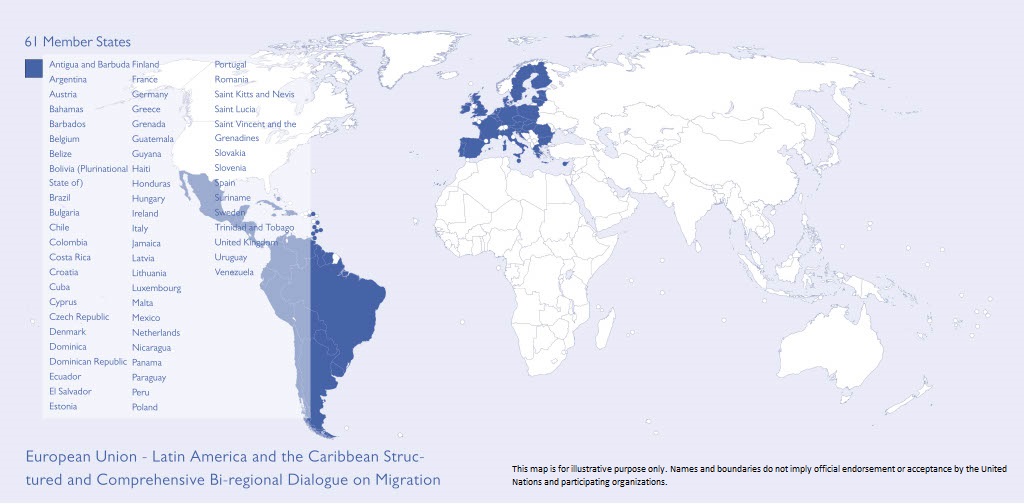-
Who we are
WHO WE AREThe International Organization for Migration (IOM) is part of the United Nations System as the leading inter-governmental organization promoting since 1951 humane and orderly migration for the benefit of all, with 175 member states and a presence in 171 countries.
-
Our Work
Our WorkAs the leading inter-governmental organization promoting since 1951 humane and orderly migration, IOM plays a key role to support the achievement of the 2030 Agenda through different areas of intervention that connect both humanitarian assistance and sustainable development.
What We Do
What We Do
Partnerships
Partnerships
- Where we work
-
Take Action
Take Action
Work with us
Work with us
Get involved
Get involved
- Data and Research
- 2030 Agenda

Type: Inter-regional forum on migration (regions covered: Europe - Latin America– Caribbean)
Formal association with regional or multi-stakeholder organization: European Union (EU) and Community of Latin American and Caribbean States (CELAC)
Established: 2009

Objectives
The European Union, Latin America and the Caribbean Summit is a biennial meeting of heads of state and government of Latin America, the Caribbean (LAC) and the European Union (EU), which was inaugurated in 1999 to develop a strategic partnership focused on strengthening democracy, the rule of law, international peace and political stability. Since its foundation in December 2011, CELAC (Community of Latin American and Caribbean States) acts as the partner in this bi-regional process. Brazil has suspended its activities in CELAC as of January 2020. The United Kingdom has let the European Union on 1 February 2020.
The Structured and Comprehensive bi-regional Dialogue on Migration was launched on June 30, 2009 as a follow up to the commitments of the 5th EU-LAC Summit of Heads of States and Governments of May 2008. The meeting formally adopted the joint document “Basis for Structuring the EU-LAC Dialogue on Migration ”, which outlined the expected structure and content of the Dialogue and includes an indicative calendar of meetings for the coming years.
The dialogue's objectives include: (i) identification of common challenges and areas for mutual cooperation, (ii) building a stronger evidence base for EU-LAC migration in order to better understand its realities, based on the principle of shared responsibility, (iii) strengthening the commitment and willingness of both sides to discuss migration issues.
Current Thematic Focus
- Border management and combing document fraud
- Combatting discrimination, racism and xenophobia
- Combatting human trafficking
- Combat migrant smuggling
- Irregular migration
- Labor migration
- Migrant's rights
- Migration and development
- Data migration
- Remittances
- Voluntary return and reintegration
Chairing country
The Dialogue is co-chaired by the EU (Council of the EU and the European External Action Service) and CELAC.
Current Co-Chairs: Mexico for CELAC (until January 2021) and Croatia (January-June 2020)/ Germany (July-December 2020) for the Council of the EU.
Secretariat
The European Commission European External Action Service Americas acts as the Secretariat.
Until 2015 the IRF was supported through the Project “Strengthening the dialogue and cooperation between the European Union (EU) and Latin America and the Caribbean (LAC) to establish management models on migration and development policies”, implemented by IOM in coordination with FIIAPP.
- Members
-
- Antigua and Barbuda
- Argentina
- Austria
- Bahamas
- Barbados
- Belgium
- Belize
- Bolivia
- Brazil
- Bulgaria
- Chile
- Colombia
- Costa Rica
- Croatia
- Cuba
- Cyprus
- Denmark
- Dominica
- Dominican Republic
- Ecuador
- El Salvador
- Estonia
- Finland
- France
- Germany
- Greece
- Grenada
- Guatemala
- Guyana
- Haiti
- Honduras
- Hungary
- Ireland
- Italy
- Jamaica
- Latvia
- Luxembourg
- Malta
- Mexico
- Netherlands
- Nicaragua
- Panama
- Paraguay
- Peru
- Poland
- Portugal
- Romania
- Saint Kitts and Nevis
- Saint Lucia
- Saint Vincent and the Grenadines
- Slovakia
- Slovenia
- Spain
- Suriname
- Sweden
- Trinidad and Tobago
- Uruguay
- Venezuela
*Brazil suspended its activities in CELAC as of January 2020.
- Observers
-
Observer Organizations
- Meetings
-
- November 8-9, 2016, Santiago de Chile, X High-Level Meeting of EU-CELAC Structured and Comprehensive Bi-regional Dialogue on Migration
- June 22, 2015, Brussels, Technical Seminar“ EU-CELAC Migration: Perspectives and Opportunities ”
- 2nd EU-CELAC summit: Brussels Declaration 2015
- 1st EU-CELAC summit: Santiago Declaration 2013
- EU-CELAC Action Plan for 2013-2015
- 6th EU-LAC Summit: Madrid Declaration 2010
- Basis for structuring the EU-LAC Dialogue on Migration 2009
- 5th EU-LAC Summit: Lima Declaration 2008
- 4th EU-LAC Summit: Vienna Declaration 2006
- 3rd EU-LAC Summit: Guadalajara Declaration 2004
- 2nd EU-LAC Summit: Madrid Declaration 2002
- 1st EU-LAC Summit: Rio de Janeiro Declaration 1999 (FR)
- Documents
-
- Brussels Declaration “Shaping our common future: working together for prosperous, cohesive and sustainable societies for our citizens”
- Santiago Declaration
- EU-CELAC Action Plan for 2013-2015
- Madrid Declaration adopted at the 1st European Union - Latin America and Caribbean summit on 18 May 2010 and Madrid Action Plan for 2010-2012
- Basis for structuring the EU-LAC Dialogue on Migration, 2009
- Lima Declaration “Addressing our peoples' priorities together”, May 16, 2008
- Contact information
-
Security, Drugs, Climate change, Regional Affairs Americas
European External Action Service Americas
European Commission
Email: Arpad.CSEKO@eeas.europa.eu
https://eeas.europa.euInternational Organization for Migration (IOM)
Rue Belliard, 20 (7th floor), 1040
Brussels - Belgium
Phone: +32.2.894.92.30
Fax: +32.2.894.92.49
Email: info@migracion-ue-alc.euInternational and Ibero-American Foundation for Administration and Public Policies (FIIAPP)
c / Beatriz de Bobadilla, 18. 28040
Madrid - Spain
Phone: +34. 915.914.600
Fax: +34.915.342.314Website
https://ec.europa.eu/europeaid/regions/latin-america/eu-celac_en